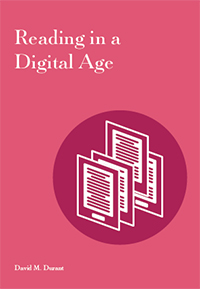
Reading in a Digital Age
Skip other details (including permanent urls, DOI, citation information): This work is licensed under a Creative Commons Attribution-NonCommercial-NoDerivatives 4.0 International License. Please contact [email protected] to use this work in a way not covered by the license.
For more information, read Michigan Publishing's access and usage policy.
Notes
-
Barry W. Cull, “Reading Revolutions: Online Digital Text and Implications for Reading in Academe,” First Monday 16, no. 6 (2011), accessed July 29, 2013, http://firstmonday.org/ojs/index.php/fm/article/view/3340/2985.
-
See David M. Durant and Tony Horava, “The Future of Reading and Academic Libraries,” portal: Libraries and the Academy 15, no. 1 (2015): 5–27; and David M. Durant, “Resistance Is Not Futile: Why Print Collections Still Matter in the Digital Age,” Against the Grain 27, no. 3 (2015): 26–28.
-
Maryanne Wolf and Mirit Barzillai, “The Importance of Deep Reading,” Educational Leadership 66, no. 6 (2009), accessed July 29, 2013, http://ase.tufts.edu/crlr/documents/2009EL-ImportanceDeepReading.pdf.
-
Christopher Rowe, “The New Library of Babel?,” First Monday 18, no. 2 (2013), accessed July 29, 2013, http://firstmonday.org/htbin/cgiwrap/bin/ojs/index.php/fm/article/view/3237/3416.
-
N. Katherine Hayles, “How We Read: Close, Hyper, Machine,” ADE Bulletin 150 (2010), accessed August 24, 2015, http://nkhayles.com/how_we_read.html.
-
Ibid.
-
Wolf and Barzillai, “The Importance of Deep Reading.”
-
Ibid.
-
For a good overview, see Kevin Kelly, “Reading in a Whole New Way,” Smithsonian Magazine, July–August 2010, accessed July 30, 2013, http://www.smithsonianmag.com/specialsections/40th-anniversary/Reading-in-a-Whole-New-Way.html.
-
Sven Birkerts, The Gutenberg Elegies: The Fate of Reading in an Electronic Age (New York: Faber & Faber, 2006), 154.
-
Nicholas Carr, “Is Google Making Us Stupid?,” The Atlantic, July–August 2008, accessed August 27, 2015, http://www.theatlantic.com/magazine/archive/2008/07/is-google-making-us-stupid/306868/.
-
Ibid.
-
Ibid.
-
Ibid.
-
Nicholas Carr, The Shallows: What the Internet Is Doing to Our Brains (New York: Norton, 2010).
-
Ibid., 118.
-
Gary W. Small, Teena D. Moody, Prabha Siddarth, and Susan Y. Bookheimer, “Your Brain on Google: Patterns of Cerebral Activation during Internet Searching,” American Journal of Geriatric Psychiatry 17, no. 2 (2009): 116–26, accessed July 29, 2013, doi:10.1097/JGP.0b013e3181953a02.
-
See Carr, The Shallows, 120–26.
-
Jakob Nielsen, “F-Shaped Pattern for Reading Web Content,” Jakob Nielsen’s Alertbox, April 17, 2006, accessed July 29, 2013, http://www.nngroup.com/articles/f-shaped-pattern-reading-web-content/.
-
Information Behaviour of the Researcher of the Future (London: University College, 2008): 10, accessed July 28, 2013, http://www.educause.edu/library/resources/information-behaviour-researcher-future.
-
Wolf and Barzillai, “The Importance of Deep Reading.”
-
Hayles, “How We Read.”
-
Ferris Jabr, “The Reading Brain in the Digital Age: The Science of Paper versus Screens,” Scientific American, April 11, 2013, accessed August 28, 2015, http://www.scientificamerican.com/article/reading-paper-screens/.
-
Naomi S. Baron, Words Onscreen: The Fate of Reading in a Digital World (Oxford: Oxford University Press, 2015), 39.
-
Ibid., 88.
-
Michael S. Rosenwald, “Serious Reading Takes a Hit from Online Scanning and Skimming, Researchers Say,” Washington Post, April 6, 2014, accessed August 29, 2015, http://www.washingtonpost.com/local/serious-reading-takes-a-hit-from-online-scanning-and-skimming-researchers-say/2014/04/06/088028d2-b5d2-11e3-b899-20667de76985_story.html.
-
Ibid.
-
Susan Greenfield, Mind Change: How Digital Technologies Are Leaving Their Mark on Our Brains (New York: Random House, 2015), 233.
-
Maryanne Wolf, “Our ‘Deep Reading’ Brain: Its Digital Evolution Poses Questions,” Nieman Reports, Summer 2010, accessed August 28, 2015, http://niemanreports.org/articles/our-deep-reading-brain-its-digital-evolution-poses-questions/.
-
Baron, Words Onscreen, 39.
-
Ibid.
-
Diane Wachtell, “Books Aren’t Crucial, but Long-Form Texts Are,” The Chronicle Review, September 26, 2010, accessed August 29, 2015, http://chronicle.com/article/Books-Arent-Crucial-but/124569/.
-
Ibid.
-
Nick Bilton, I Live in the Future & Here’s How It Works (New York: Crown Business, 2010), 48.
-
Ibid., 136.
-
Ibid.
-
Clive Thompson, “Reading War and Peace on My iPhone,” Book Riot, 2015, accessed August 29, 2015, http://bookriot.com/quarterly/bkr07/.
-
John Jones, “Book Lacks Digital Reading Details,” DML Central, July 20, 2015, accessed August 29, 2015, http://dmlcentral.net/book-lacks-digital-reading-details/.
-
Alan Jacobs, The Pleasures of Reading in an Age of Distraction (Oxford: Oxford University Press, 2011), 82.
-
Ibid.
-
George Stachokas. After the Book: Information Services for the 21st Century (London: Chandos Publishing, 2014), 16.
-
Mathew Ingram, “No, E-book Sales Are Not Falling, despite What Publishers Say,” Fortune, September 24, 2015, accessed December 16, 2015, http://fortune.com/2015/09/24/ebook-sales/.
-
Quoted in Rachel Nuwer, “Are Paper Books Really Disappearing?,” BBC, January 25, 2016, accessed February 9, 2017, http://www.bbc.com/future/story/20160124-are-paper-books-really-disappearing.
-
Ibid.
-
Marc Prensky, “In the 21st-Century University, Let’s Ban (Paper) Books,” The Chronicle of Higher Education, November 13, 2011, accessed December 16, 2015, http://chronicle.com/article/In-the-21st-Century/129744/.
-
Christine Rosen, “People of the Screen,” The New Atlantis, Fall 2008, accessed August 7, 2017, http://www.thenewatlantis.com/publications/people-of-the-screen.
-
For example, see Clay Shirky, Cognitive Surplus: Creativity and Generosity in a Connected Age (New York: Penguin, 2010).
-
Quoted in Nicholas Carr, “Containers and Their Contents,” Rough Type (blog), January 3, 2013, accessed July 30, 2013, http://www.roughtype.com/?p=2315.
-
Kelly, “Reading in a Whole New Way.”
-
Quoted in Nuwer, “Are Paper Books Really Disappearing?”
-
Kevin Kelly, “Scan This Book!,” New York Times Magazine, May 14, 2006, accessed July 31, 2013, http://www.nytimes.com/2006/05/14/magazine/14publishing.html.
-
Nicholas Carr, “The Remains of the Book,” Rough Type (blog), September 30, 2011, accessed July 31, 2013, http://www.roughtype.com/archives/2011/09/the_seethrough_1.php.
-
Jeff Staiger, “How E-books Are Used: A Literature Review of the E-book Studies Conducted from 2006 to 2011,” Reference & User Services Quarterly 51, no. 4 (2012): 361, accessed July 29, 2013, doi:10.5860/rusq.51n4.355.
-
Jakob Nielsen, “iPad and Kindle Reading Speeds,” Jakob Nielsen’s Alertbox, July 2, 2010, accessed July 31, 2013, http://www.nngroup.com/articles/ipad-and-kindle-reading-speeds/.
-
F. Kretzschmar, D. Pleimling, J. Hosemann, S. Füssel, I. Bornkessel-Schlesewsky, and M. Schlesewsky, “Subjective Impressions Do Not Mirror Online Reading Effort: Concurrent EEG-Eyetracking Evidence from the Reading of Books and Digital Media,” PLoS ONE 8, no. 2 (2013): e56178, accessed August 30, 2015, doi:10.1371/journal.pone.0056178.
-
Ibid.
-
Ibid.
-
Sara J. Margolin, Casey Driscoll, Michael J. Toland, and Jennifer Little Kegler, “E-readers, Computer Screens, or Paper: Does Reading Comprehension Change across Media Platforms?,” Applied Cognitive Psychology 27 (2013): 512–19.
-
Anne Mangen, Bente R. Walgermo, and Kolbjørn Brønnick, “Reading Linear Texts on Paper versus Computer Screen: Effects on Reading Comprehension,” International Journal of Educational Research 58 (2013): 61–68, doi:10.1016/j.ijer.2012.12.002.
-
Alison Flood, “Readers Absorb Less on Kindles than on Paper, Study Finds,” The Guardian, August 19, 2014, accessed August 31, 2015, http://www.theguardian.com/books/2014/aug/19/readers-absorb-less-kindles-paper-study-plot-ereader-digitisation.
-
Ibid.
-
Hayles, “How We Read.”
-
Jeremy Greenfield, “Ebooks Will Make Us Dumber, or They Won’t,” Forbes, August 20, 2014, accessed August 31, 2015, http://www.forbes.com/sites/jeremygreenfield/2014/08/20/will-ebooks-make-us-dumber/.
-
Kathryn Zickuhr and Lee Rainie, “E-reading Rises as Device Ownership Jumps,” Pew Internet & American Life Project, January 16, 2014, accessed August 31, 2015, http://www.pewinternet.org/2014/01/16/e-reading-rises-as-device-ownership-jumps/.
-
Ibid.
-
Claire Cain Miller and Julie Bosman, “E-books Outsell Print Books at Amazon,” New York Times, May 19, 2011, accessed July 28, 2013, http://www.nytimes.com/2011/05/20/technology/20amazon.html.
-
“E-book Sales Are up 43%, but That’s Still a ‘Slowdown,’” USA Today, May 16, 2013, accessed July 28, 2013, http://www.usatoday.com/story/life/books/2013/05/15/e-book-sales/2159117/.
-
Rick Anderson, “Print on the Margins: Circulation Trends in Major Research Libraries,” Library Journal, June 2, 2011, accessed March 31, 2015, http://lj.libraryjournal.com/2011/06/academic-libraries/print-on-the-margins-circulation-trends-in-major-research-libraries/.
-
Alexandra Alter, “The Plot Twist: E-book Sales Slip, and Print Is Far from Dead,” New York Times, September 22, 2015, accessed December 16, 2015, http://www.nytimes.com/2015/09/23/business/media/the-plot-twist-e-book-sales-slip-and-print-is-far-from-dead.html.
-
Ibid.
-
Jeremy Greenfield, “Study: Ebook Growth Stagnating in 2013,” Digital Book World, October 30, 2013, accessed March 31, 2015, http://www.digitalbookworld.com/2013/study-ebook-growth-stagnating-in-2013/. Cited by Nicholas Carr, “Peak Ebook?,” Rough Type (blog), November 7, 2013, accessed March 31, 2015, http://www.roughtype.com/?p=3966.
-
“Children’s and Young Adult Hardback Books up 95.2% in July 2016 vs. July 2015,” Association of American Publishers, December 20, 2016, accessed February 13, 2017, http://newsroom.publishers.org/childrens-and-young-adult-hardback-books-up-952-in-july-2016-vs-july-2015/.
-
Ingram, “E-book Sales.”
-
Kate Stoltzfus, “Do ‘Digital Natives’ Prefer Paper Books to E-books?,” Education Week, November 8, 2016, accessed February 13, 2017, http://www.edweek.org/ew/articles/2016/11/09/do-digital-natives-prefer-paper-books-to.html.
-
Andrew Richard Albanese, “Print or Digital, It’s Reading That Matters,” Publishers Weekly, September 16, 2016, accessed February 12, 2017, http://www.publishersweekly.com/pw/by-topic/digital/content-and-e-books/article/71500-print-digital-and-what-really-matters.html.
-
Alter, “The Plot Twist.”
-
Padraig Belton and Matthew Wall, “Did Technology Kill the Book or Give It New Life?,” BBC, August 14, 2015, accessed August 31, 2015, http://www.bbc.com/news/business-33717596.
-
Quoted in Alison Flood, “Ebook Sales Falling for the First Time, Finds New Report,” The Guardian, February 3, 2016, accessed February 12, 2017, https://www.theguardian.com/books/2016/feb/03/ebook-sales-falling-for-the-first-time-finds-new-report.
-
Ibid.
-
Alter, “The Plot Twist.”
-
Monica Anderson, “Technology Device Ownership: 2015,” Pew Research Center, October 29, 2015, accessed December 18, 2015, http://www.pewinternet.org/2015/10/29/technology-device-ownership-2015/.
-
Andrew Perrin, “Book Reading 2016,” Pew Research Center, September 1, 2016, accessed February 11, 2017, http://www.pewinternet.org/2016/09/01/book-reading-2016/.
-
Todd Wasserman, “Why E-readers Are the Next iPods,” Mashable, June 27, 2014, accessed August 31, 2015, http://mashable.com/2014/06/27/e-readers-next-ipods/?utm_cid=mash-com-Tw-main-link.
-
Jennifer Maloney, “The Rise of Phone Reading,” Wall Street Journal, August 14, 2015, accessed February 12, 2017, https://www.wsj.com/articles/the-rise-of-phone-reading-1439398395.
-
Ibid.
-
Ibid.
-
Andrew Albanese, “Frankfurt Book Fair 2016: PW Talks to Pew Research Center’s Lee Rainie about Reading in the Digital Age,” Publishers Weekly, October 21, 2016, accessed February 12, 2017, http://www.publishersweekly.com/pw/by-topic/international/Frankfurt-Book-Fair/article/71787-frankfurt-book-fair-2016-pw-talks-to-pew-research-center-s-lee-rainie-about-reading-in-the-ditgital-age.html.
-
Jordan Selburn, “Ebook Readers: Device to Go the Way of Dinosaurs?,” IHS iSuppli, December 10, 2012, accessed December 18, 2015, https://technology.ihs.com/417568/ebook-readers-device-to-go-the-way-of-dinosaurs. Cited by Nicholas Carr, “E-reading after the E-reader,” Rough Type (blog), December 30, 2012, accessed July 31, 2013, http://www.roughtype.com/?p=2245.
-
Perrin, “Book Reading 2016.”
-
Quoted in Albanese, “Frankfurt Book Fair 2016.”
-
“New Research Reveals Unexpected Positive Outlook for the Printed Book, Due to Love of the Medium,” Ricoh Americas Corporation, December 9, 2013, accessed December 18, 2015, https://www.ricoh-usa.com/news/news_release.aspx?prid=1164&alnv=pr.
-
Ibid.
-
Michael S. Rosenwald, “Why Digital Natives Prefer Reading in Print. Yes, You Read That Right,” Washington Post, February 22, 2015, accessed August 31, 2015, http://www.washingtonpost.com/local/why-digital-natives-prefer-reading-in-print-yes-you-read-that-right/2015/02/22/8596ca86-b871-11e4-9423-f3d0a1ec335c_story.html.
-
Chan Li, Felicia Poe, Michele Potter, Brian Quigley, and Jacqueline Willis, “UC Libraries Academic E-book Usage Survey: Springer E-book Pilot Project,” University of California Libraries (May 2011), 12, accessed July 31, 2013, http://www.cdlib.org/services/uxdesign/docs/2011/academic_ebook_usage_survey.pdf. Cited by Nicholas Carr, “Another Study Points to Advantages of Printed Textbooks,” Rough Type (blog), June 27, 2011, accessed July 31, 2013, http://www.roughtype.com/?p=1496.
-
Ibid.
-
Li, Poe, Potter, Quigley, and Willis, “UC Libraries,” 11.
-
Beth Jacoby, e-mail to COLLDV-L mailing list, November 17, 2012, accessed July 31, 2013, http://serials.infomotions.com/colldv-l/archive/2012/201211/0221.html.
-
Staiger, “How E-books Are Used,” 362.
-
Baron, Words Onscreen, 85.
-
Perrin, “Book Reading 2016.”
-
Jim Milliot, “As E-book Sales Decline, Digital Fatigue Grows,” Publishers Weekly, June 17, 2016, accessed February 13, 2017, http://www.publishersweekly.com/pw/by-topic/digital/retailing/article/70696-as-e-book-sales-decline-digital-fatigue-grows.html.
-
Ibid.
-
Stoltzfus, “Do ‘Digital Natives’ Prefer Paper Books?”
-
Staiger, “How E-books Are Used,” 362.
-
Quoted in Alter, “The Plot Twist.”
-
Nick Bilton, “The Allure of the Print Book,” Bits (blog), New York Times, December 2, 2013, accessed March 27, 2015, http://bits.blogs.nytimes.com/2013/12/02/the-print-book-here-to-stay-at-least-for-now/.
-
Clay Shirky, “Why I Just Asked My Students to Put Their Laptops Away,” Medium, September 8, 2014, accessed August 31, 2015, https://medium.com/@cshirky/why-i-just-asked-my-students-to-put-their-laptops-away-7f5f7c50f368.
-
Julie Bosman and Matt Richtel, “Finding Your Book Interrupted . . . by the Tablet You Read It On,” New York Times, March 4, 2012, accessed July 31, 2013, http://www.nytimes.com/2012/03/05/business/media/e-books-on-tablets-fight-digital-distractions.html?_r=1&hp.
-
Michael Sacasas, “Borg Complex: A Primer,” The Frailest Thing, March 1, 2013, accessed March 1, 2015, http://thefrailestthing.com/2013/03/01/borg-complex-a-primer/.
-
Quoted in Eric Weiner, “Technology of Books Has Changed, but Bookstores Are Hanging in There,” NPR, May 28, 2015, accessed August 31, 2015, http://www.npr.org/2015/05/28/408787099/the-technology-of-books-has-changed-but-bookstores-are-hanging-in.
-
Ibid.
-
Jeanne Whalen, “Read Slowly to Benefit Your Brain and Cut Stress,” Wall Street Journal, September 16, 2014, accessed August 7, 2017, https://www.wsj.com/articles/read-slowly-to-benefit-your-brain-and-cut-stress-1410823086.
-
Maura Kelly, “A Slow-Books Manifesto,” The Atlantic, March 26, 2012, accessed August 31, 2015, http://www.theatlantic.com/entertainment/archive/2012/03/a-slow-books-manifesto/254884/.
-
Whalen, “Read Slowly.”
-
Quoted in Albanese, “Frankfurt Book Fair 2016.”
-
Carr, The Shallows, 118.
-
Wendy Griswold, Regionalism and the Reading Class (Chicago: University of Chicago Press, 2008), 66.
-
Christopher Ingraham, “The Long, Steady Decline of Literary Reading,” Wonkblog (blog), Washington Post, September 7, 2016, accessed February 13, 2017, https://www.washingtonpost.com/news/wonk/wp/2016/09/07/the-long-steady-decline-of-literary-reading/.
-
Quoted in Albanese, “Frankfurt Book Fair 2016.”
-
Rosenwald, “Serious Reading Takes a Hit.”
-
Maria Konnikova, “Being a Better Online Reader,” The New Yorker, July 16, 2014, accessed August 31, 2015, http://www.newyorker.com/science/maria-konnikova/being-a-better-online-reader.
-
Ibid.


